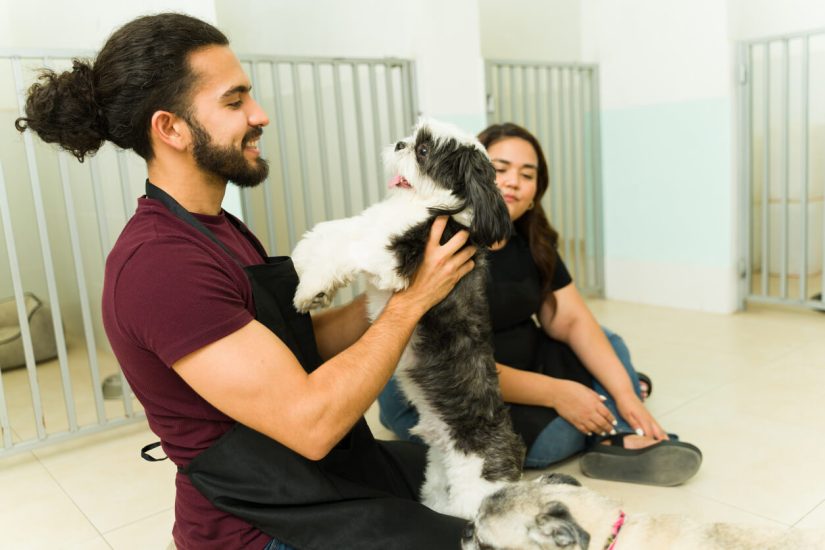If your furry best friend gazes at you with soulful eyes or paces the house, you may wonder, “Is my dog bored?” Just as fans await the next release from their favorite Irish band or look forward to a breakthrough album with an accompanying music video, our canine companions crave fresh experiences and engaging entertainment.
Boredom in dogs isn’t just about not having enough toys, but about lacking a blend of mental stimulation, physical exercise, diverse treats, and meaningful connections—whether with you, other dogs at the dog park, or new friends at dog daycare.
What Causes Doggy Boredom?
All dogs, whether active puppies, senior dogs, or popular dog breeds, can suffer from boredom if their needs for stimulation and activity aren’t met. Often, simply repeating the same walks, throwing the same squeaky toys, and sticking to routine meals of kibble can feel like listening to the same song on repeat. Over time, your pooch may start displaying new behaviors like barking, pacing, or even destructive behavior, boredom’s version of a tired pop single yearning for a remixed form.
Canine boredom doesn’t discriminate. Whether your four-legged friend has experienced generally favorable reviews from the neighborhood (for being sweet or mild-mannered) or is known for reaching number one in energy, all dogs need opportunities for social play, problem-solving, and adventure.
How to Recognize a Bored Dog
Boredom in dogs isn’t always obvious. While some pups make their need for stimulation loud and clear, others reveal their restlessness through subtle changes in mood and behavior. Knowing what to watch for can help you catch boredom early, so you can help your furry friend before frustration builds.
- Pacing and Waiting: An understimulated dog may walk back and forth across the same path or sit by the door, staring and waiting for someone to offer a walk, game, or fresh environment. This type of restless movement is their way of showing they’re hoping for action.
- Vocalizing: A bored dog often barks at what seems like nothing—passersby, birds, or distant sounds. These attention-seeking woofs and whines are invitations for you to provide some entertainment or social interaction.
- Chewing or Destruction: If you come home to shredded shoes, gnawed furniture, or battered interactive toys, your dog is likely channeling their excess energy and frustration into chewing or tearing things apart. This behavior can quickly become a habit if boredom isn’t addressed.
- Digging or Escaping: Dogs with unspent energy may dig up the yard or attempt to squeeze out of fences, seeking stimulation and possibly new friends beyond their usual territory. This adventurous behavior is often triggered by boredom and curiosity.
- Withdrawal or Apathy: Some dogs respond to boredom by losing interest in the activities they once enjoyed, such as regular walks, playtime, or treats. You might notice your dog seeming listless, napping more than usual, or ignoring opportunities for fun.
- Nuisance Behaviors: When your dog is bored, new, mischievous habits, like stealing food off counters when you aren’t looking or hoarding socks, can develop. These playful yet problematic actions are your dog’s attempt to make its own fun.
Dogs with chronic boredom may become anxious or withdrawn, so it’s important to address canine boredom before it escalates—just as an album benefits from fresh tracks and not just the previous songs.
How to Relieve Canine Boredom: Fresh Ideas for Every Pup
Boredom doesn’t have to be part of your dog’s daily routine. Just as a breakthrough album or an exciting new music video can capture an audience’s attention, introducing variety and creative enrichment can transform your furry friend’s day. With a few simple adjustments, you can keep your dog’s mind sharp, body active, and spirit joyful.
Switch Up Your Walks and Try Different Routes
If you typically circle the same block, try different routes or explore a new dog park. Let your dog pause to sniff; this is their natural way to “read the news” and exercise their minds. For dogs with high energy, incorporate more vigorous exercise such as running, hiking, or a little backyard agility.
Make Meals a Game
Use puzzle toys, treat-dispensing balls, or a muffin tin filled with kibble and bits of wet food. Hide treats, invite a playful “treasure hunt,” or use snuffle mats to encourage natural foraging. These challenges will keep your furry friend entertained and sharpen their problem-solving skills.
Rotate and Introduce New Toys
Cycle squeaky toys, interactive toys, and treat-dispensing toys every few days. Even a once-beloved toy takes on new appeal after a break. Store unused toys out of sight between rotations to make each reappearance feel novel and exciting.
Organize Puppy Playdates and Social Activities
Socialization isn’t just for puppies. Regular meetups at dog parks or with a doggy daycare group let your dog build confidence, make new friends, and burn energy through active play—just like fans sharing their thoughts on a re-released hit.
Schedule Short, Focused Training Sessions
A few minutes each day teaching new tricks or reviewing old ones (sit, stay, down, spin, high five) will stretch their minds and help prevent boredom. Training helps your furry companion focus, and positive reinforcement keeps their interest high.
Create Home Challenges
Build simple indoor or backyard agility courses with chairs and broomsticks, or play classic games like hide-and-seek with your puppy or your older dog’s favorite toy. Games help your puppy or older dog build confidence and stay entertained, just like a music video adds visual flair to a favorite tune.
Consider Professional Help When Needed
Sometimes, enlisting a dog walker or joining a reputable dog daycare is invaluable, especially for busy families or when companionship is needed. These experiences prevent doggy boredom and encourage healthy, positive dog behaviors even when you can’t be there.
More Than a Tired Dog: Why Mind Matters
While physical exercise is important, lasting contentment comes from blending movement with mental stimulation. After all, running the same laps every day is like playing the same song endlessly—a formula for boredom and not true fulfillment.
Give your dog opportunities for both: rotate treats, teach a new command, or create a snuffling snuffle mat challenge after a walk. This holistic approach leads to a happier, more balanced furry friend.
When to Ask for Professional Support
While most cases of dog boredom can be addressed with engaging activities and extra attention, sometimes the signs point to something more serious. If your furry friend is showing intense or persistent changes in behavior, it may be time to seek advice from a professional.
Don’t hesitate to reach out to professionals—getting the right support can help your dog return to being a relaxed, happy companion.
- Ongoing Anxiety or Restlessness: If your dog seems constantly anxious, paces for extended periods, or is unable to relax even after plenty of activity, it may point to deeper anxiety that could benefit from a veterinarian’s or behaviorist’s perspective.
- Persistent Destructive Behavior: When chewing, digging, or other problem behaviors continue despite your enrichment efforts, a certified dog trainer can assess your dog’s environment and help develop a custom plan to redirect those habits positively.
- Sudden Changes in Appetite or Sleep: Major shifts, such as suddenly refusing food, overeating, or changes in sleep patterns, can signal medical concerns or stress. A timely visit to your veterinarian is important to rule out sickness and ensure your dog’s overall well-being.
- Unusual Withdrawal or Aggression: If your dog becomes unusually withdrawn, aggressive, or fearful, this can be a sign that professional guidance is needed to provide comfort, manage emotions, and help your pet feel secure again.
Take the Next Step Toward a Happier, More Enriched Life for Your Dog
Keeping your dog curious, confident, and joyful means mixing up their daily routine with activities that match their unique needs—whether that’s exploring new park routes, introducing puzzle feeders, or scheduling social playtime. Every pup is different, and small changes can have a big impact on their happiness and well-being.
For fresh enrichment ideas or specialized support, connect with dedicated professionals like the team at Central Bark. Our expertise and whole dog care approach can help make every day more fun and fulfilling for your furry friend.
Want practical tips or a personalized plan for your dog? Contact us to bring more excitement, learning, and happiness into your dog’s life.





